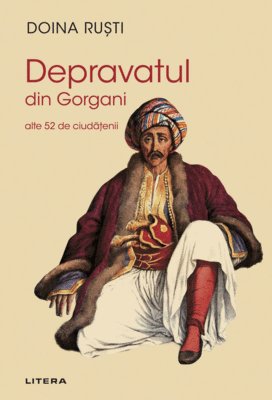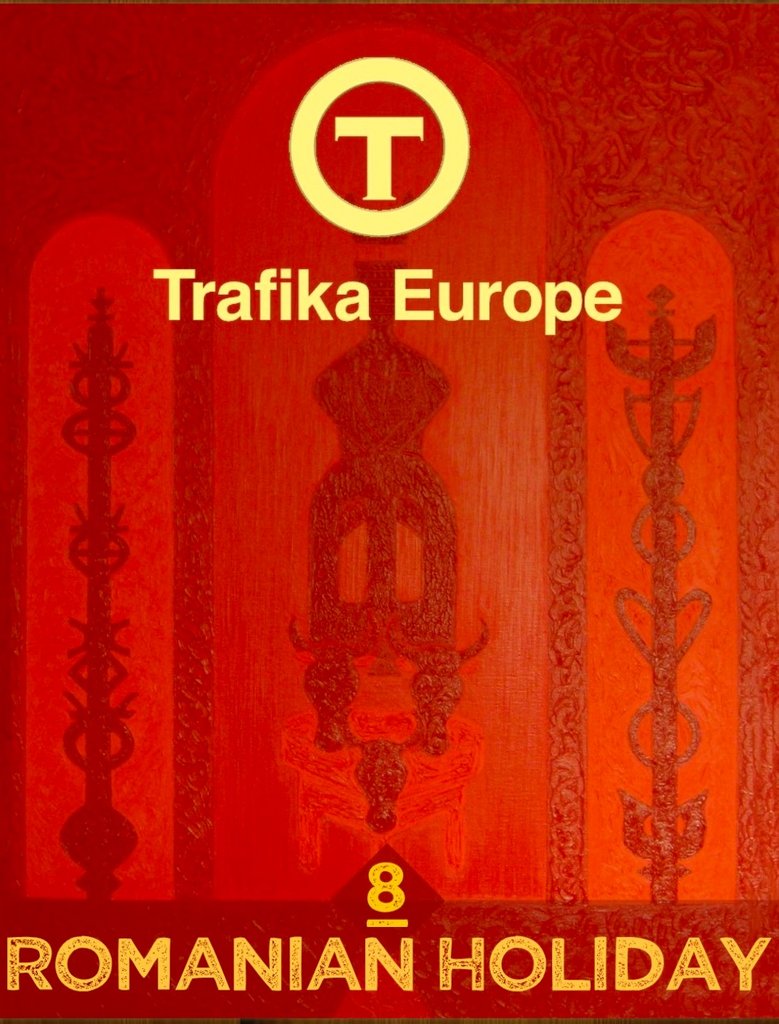
There was something inhuman about this whole encounter. The tall mallows, the hemlock and bushes around made the whole story seem out of touch with real life. The rest was spontaneous and almost mystical: a quick connection under the blueberry branches. Some mallows broke, the man's shoe rolled to the fence, and Elina lost a shoelace.
A story from the volume Depravatul din Gorgani:
Andrew K. Davidson, tr.
Daniela&Matt Riain revised tr.
The history of Vașcu the monk is made up of 200 events, both dramatic and memorable. He was never a handsome man. Nor capable. Nor was he stately. Nor was he even likeable. His power was rooted solely in desire, both subtle and firm.
Some may still remember him: passing through the monastery gates in the mornings, his silhouette floating like a feather following behind a covered wagon. Without rushing in the slightest, he would go down the gray street where he would always stop in the shade of the grapevine canopy on the outskirts of the Flower Market.
Back then, the place was so crowded that people’s faces brushed together in passing, while the monk’s eyes would close, unable to grasp all the details of the rustling movements.
In fact, he let himself get (become) drowsy on the aroma of the market, breathing in the heated oil of lily-of-the-valley or listening to the sighing of hundreds of underarms. It was not important to him where the scents came from, and if someone asked him - he only knew the names of three flowers. Usually, the monk thought of nothing. He was a languid man under the cover of the green hat of a small stand. On the painted plank there was a string of honey jars, wax and honeycombs - out of which sometimes popped out the tuft of a bee’s head.
However, despite his sitting motionless on the chair of spruce wood, beyond his gentle face, there was a commotion as great as that within the heart of a hive, as he feverishly took in the rustling of silk hems, thighs moistened with all the moving about, reddened ears and the distant clamor from coral lips.
He seemed to be nailed to the chair with the backrest, but his whole being was part of the thick life of the market. And in the siege of reaching arms, among their agitated temples, their waving curls, there was always someone, a woman like acacia syrup, for whom Vașcu the monk would give up his life. And it was not only an impulse, but an engagement he so thoroughly lived that if someone entered under his canopy, even the abbot himself or Saint Michael in the flesh, they would not have been able to wake him up. Not even the side of an eyebrow would have moved on his face.
When Vașcu detected a woman to his taste, he summoned his forces.
It was never a question of a particular woman. There was no typology of the victim. On the contrary, Vașcu’s women were each quite different – young and old, happy and eroded by discontent, there were godly women and well known whores, gentle ones and fiery, vindictive ones, chatterboxes, quiet ones, amorous ones, the naïve and the downright criminal.
Vașcu the monk, nearly asleep in the shade, felt in the distance the misty breath of a beloved to-be. It was a vibration wetting the air around his ears, a slight pulse of begging blood. And in this gentle breeze, from within the narrow passageways of arteries and cartilage, his entire, lifeless population would awaken. Billions of invisible beings went to war, the meek and the brave, as one army, like a river of fire.
Vașcu was leaning on the chair’s long back, with his chin to a shoulder, but his real life was gushing like a swollen tongue among jars of honey, next to potted daisies, among colorful sleeves under the insatiable, summer sun. He was like a starved reptile, like a hot chocolate sperm whale in a crazy dash, among the mindless heads in the Flower Market.
And this passive man’s desire, strong and swift, could penetrate all human flesh.
When the desire reached the rising mist of the chosen woman, the small market shuddered discreetly, while the distant rustling of crimped linens was heard under flowerpots.
Vașcu’s desire would break through, melting the flowers and withering the buds of the innocent women’s flesh, arresting her next to a pot of oleanders, hanging her in a windowsill, perching her on a chair but with arms reaching out towards packed shelves of begonias. Touched by the placid monk’s tongue, any woman was transformed into a larva, incomplete and shrouded in heavy flames.
The monk knew very well what was happening. He knew the sadness of defeated flesh and he felt the helplessness of enslaved blood. Still, with each new conquest, the more he liked it in his skin, in the gurgling darkness, where a thousand heroes were running.
Meanwhile, life was moving forward.
In the Flower Market, under the leafy umbrella, Vașcu the monk appeared to be sleeping, while hundreds of women were slowly withering of sadness. Through a window of a house someone was looking at the monk’s crouched body, seeing the hardened hands in his lap, examined the holy man’s eyelids. However, she did not dare approach the reticent monk, no matter how her tear ducts burned. For nights she would dream of him, and for hours would allow herself to be guided by an invisible, whip-like tongue tip. But, once in the Flower Market, when approaching the sleepy Don Juan, she would hit an invisible wall like a thin barrier that protected his adolescent-like figure.
No one had known the small monk to make a sound, no one had seen the color of his eyes. Nobody had ever been able to ask him anything. In short, Vașcu was a sleeping, anesthetic man, and the market was under the spell of his desire.
In love with the quiet monk, many women wept in silence. Some committed suicide. Some still stay within monastery walls, and others allow themselves to be consumed by social activities.
Even the very beautiful Elena Razelta, who had fainted several times near the booth with honey, ended up married to a rude merchant, seeking peace in a story of self-flagellation.
Evidently, Vașcu the monk was aware of all these pains. Under the canopy at the outskirts of the market, from time to time, a smoke signal reached him. And among the many affairs of this taciturn monk, one April day when the market was filled with lilac, the expected woman crept in.
Alisa. That was her name.
The daughter of a pastry chef, famous for his walnut cookies – whose fame reflected on Alisa – she roamed the streets with the pride of provenance feathering her shoulders. Her hair was black and so shiny that in the satin fabric of the day, from a distance, it looked like a house martin in flight. It was just before noon when the silk shoe of Alisa passed hastily by the canopy almost drained by the winter’s tongues.
A wasp was buzzing above the jars, and the sun’s feathery light was breathing through the roof slats.
The black hair fluttered by a tulip’s cup-shaped bloom, and the pride of the caste, the crackling of burning wood and the aroma of walnut cake spread in the market air.
The mist, as spicy as a mustard seed, smacked Vașcu. And, as in so many other occasions, the small beings invaded all-out, the maniacal tongue and the compulsive desire acting like swords, plunged mercilessly into Alisa’s flesh, yet unknown.
The market sighed, and several pairs of eyes strained through bouquets of lilac, up to the stand where the little man rested sleepily covered up in the old habit.
Alisa received the message like the prick of a thorn. Around her, the world swarmed, bouquets of flowers swayed, and she remained in the centre, like a drugged cat. A scalding and perverse stream was rolling in her muscle fibers, her swelling glands and the walls of her throat.
The rape was being staged from close proximity by a mind that made no effort to be discrete. On the contrary, it exuded emotion, proud and confident in its power.
Alisa rolled her eyes, casually observing the piles of white flowers, the moving heads, the wicker baskets and the cages with goldfinches, until, between two perplexed shoulders, she laid eyes on the barren stand, under which Vașcu the monk slumbered. Watching his lowered eyelids, relaxed face and ears reddened with exertion, she was struck with the same desperate passion that had struck half the women in the Flower Market. Hesitating, she went over to the honey stand, from where the impatient, snake-like desire was emanating.
Alisa walked alongside the rows of jars, up to the white chair.
The monk was bent like a currant branch. He knew very well that Alisa was looking at him. He had heard her steps, had felt her pulse and had tasted her cloud-like soul. However, he remained frozen. The April sun warmed the top of his head, and in the darkness of his being, the millions of warriors fed him with the joy of victory.
Another woman had become attached to him.
But Alisa did not see it that way. She was disturbed and was almost overwhelmed by panic, but not enough to not feel the light tremors of the invading soul. The monk’s fingers, white and delicate, were throbbing as if they had been strumming a guitar for hours on end, and under his eyelids, through his opaque skin, a distressed anthill was moving.
To her, the sleeping man was only the interlocutor of this most complicated and dangerous apparatus.
Alisa’s ears perked up instinctively. The market stirred slowly, and the blood of hundreds of seduced women let out a unified sigh.
Bewildered, she took a step, that last step, which no woman had dared to make, and when the treacherous April breeze passed by her ears, Alisa thrust her teeth into the pouting lips of Vașcu the monk.
At first, the vast army went numb like tongue burnt by fire, and then, in cutting silence, one after another, the bodies of his unbeaten soldiers fell. And, grieving for the darkness left over him, Vașcu finally raised his eyelids.
Alisa was watching with a single eye, unflinching and severe.
The market fell silent, and of the formerly fervent army, not a trace remained. The disturbance of Alisa’s teeth, or her unwavering stare, was not as great as the pain of his inner peace. The great, thirsty tongue became a dry leaf, and he grew very weak. All his desire melted, all its hubris, and sticky birds flew from 200 hearts.
The women breathed the freedom air again, those who had yearned for the little monk for so long. Some fled from monasteries, others finally looked into mirrors and rushed to stores for earrings and silks. Obviously, Elena Razelta got a hasty divorce, leaving the merchant in a long depression. Even the ones on their deathbeds stirred to their senses. The most determined to commit suicide before and those who were sighing among the flowers, the women wounded, those whom even the Good Lord came to discard, all the women who were mercilessly raped by Vașcu the monk’s impetuous desire left their shells, which had become soft as jelly.
Under the April sun, a breath of life rustled in the Flower Market.
Alisa delicately licked the string of blood that seeped from Vașcu’s bewildered lips.
Impassive dragonflies hovered in his eyes, open for the first time.
And standing face to face, both understood, each in their own way, that a happiness, previously restrained, filled the square. In fragile flower petals with mauve inflorescence, thousands of fiery beads exploded, while vine shoots stretched inconspicuously over the stand’s old roof.
